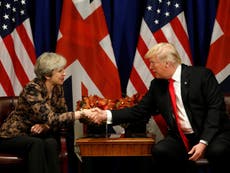Donald Trump's brazen attack on Matt Lauer and support for Roy Moore all part of media circus
President using Twitter to engineer controversy and steer conversation away from sexual harassment allegations against himself

This morning, after the news broke that NBC News has fired veteran anchor Matt Lauer for inappropriate sexual behaviour, President Donald Trump mused that NBC executives should be fired for putting out “Fake News,” and unleashed this broadside: “Check out Andy Lack's past!”
This call for a look into vague allegations against NBC News' chairman prompted some to marvel at how “brazen” Trump is being, given the sexual charges levelled at him, too. Similar surprise greeted Trump's willingness to endorse Roy Moore while shrugging that Moore “totally denies” the believable charges against him, as that reminded everyone just how lacking in credibility were his own dismissals of so many equally believable accounts about himself.
But such incredulity misses the deeper significance of this stuff. The brazenness of it is the whole point - his utter shamelessness itself is meant to achieve his goal. In any given case, Trump is not trying to persuade anyone of anything as much as he is trying to render reality irrelevant, and reduce the pursuit of agreement on it to just another part of the circus. He's asserting a species of power - the power to evade constraints normally imposed by empirically verifiable facts, by expectations of consistency, and even by what reasoned inquiry deems merely credible. The more brazen or shameless, the more potent is the assertion of power.
The Post reports today that Trump has taken to privately questioning the authenticity of the Access Hollywood tape of him repeatedly boasting about his affection for sexual assault. The Post also reports that when things are going particularly badly, he calls confidantes to “boast about his successes.”
Meanwhile, The New York Times reports that Trump regularly brags to people about winning a majority of women - he didn't - and has even reverted to questioning the authenticity of Barack Obama's birth certificate. Trump's advisers sometimes even steer him away from areas where he is prone to dabbling in “manufactured facts.”
To date, Trump has made more than 1,600 false or misleading claims as President. Routinely, the lies are demonstrably false, often laughably so. But this actually serves his ends. It is impossible to disentangle this from his constant effort to undermine the news media, seen again in today's NBC tweet. In many cases the attacks on the media are outlandishly ridiculous, dating back to the tone-setting assertion that the media deliberately diminished his inaugural crowd sizes, even though the evidence was decisive to the contrary. Here again, the absurdity is the whole point: In both the volume and outsize defiance of his lies, Trump is asserting the power to declare the irrelevance of verifiable, contradictory facts, and with them, the legitimate institutional role of the free press, which at its best brings us within striking distance of the truth.
Press critic Jay Rosen has surmised that Trump represents something broader, “an organised campaign to discredit the mainstream press in this country,” which “takes many forms.” To wit: When conservative activist James O'Keefe was busted trying to bait The Post with a false accuser of Moore, to discredit the believable charges against him, O'Keefe skipped over questions about whether he had employed the woman, instead citing laughably meaningless video “evidence” to cast further doubt on The Post's commitment to reporting the truth. Those who claim O'Keefe is now “on the defensive” miss the point. He isn't trying to win an argument. The goal is to render fact- and evidence-based inquiry itself a cause for suspicion.
Trump is not responsible for O'Keefe's antics, but they are fellow travellers. The Post's Margaret Sullivan, summing up the mindset they are both trying to achieve in their followers, quotes Hannah Arendt: “If everybody always lies to you, the consequence is not that you believe the lies, but rather that nobody believes anything any longer.” Others with similar missions have gravitated to Trump. Brian Beutler points to former Trump adviser Stephen Bannon's deep admiration for history's most successful wielders of the power of disinformation as agitprop.
I don't claim to know whether this is merely instinctual on Trump's part, or part of a strategy. As Trump biographer Tim O'Brien puts it, Trump constantly “tells fables to himself” and “about himself,” and has long self-consciously regarded this as “one of his great skills.” Trump has been doing it for so long that the separation between instinct and conscious technique has probably disappeared. But one thing is clear: Terms like “lying” or “delusional” don't do justice to what we're seeing here, and we have not yet seriously reckoned with its true nature and what it really means.
The Washington Post


Join our commenting forum
Join thought-provoking conversations, follow other Independent readers and see their replies